#larry parnes
Text
10 May 1960
Despite not having performed together in months, and their drummer not showing up, the Silver Beetles manage to audition for Larry Parnes. They snag a position backing Johnny Gentle on a seven-day tour of Scotland starting May 20th.

It was probably the matching shoes they'd just bought.

129 notes
·
View notes
Text

By macabre coincidence an event that took place around Bristol marks a major turning point in the story of pop music. Eddie Cochran died hours after appearing at the Bristol Hippodrome in 1960, as part of the Larry Parnes-produced Anglo-American rock ’n’ roll package tour. Two of the people who shared a stage with Cochran that night were Tony Sheridan and a Liverpudlian singer called Johnny Gentle. Both were under contract to Parnes and both would play a significant role in the history of the most influential British act of all time, the Beatles. Sheridan, the first British rock ’n’ roller to sing and play his own guitar live on British TV, would become best known for the recordings he made in Hamburg with the Beatles shortly before they found fame.
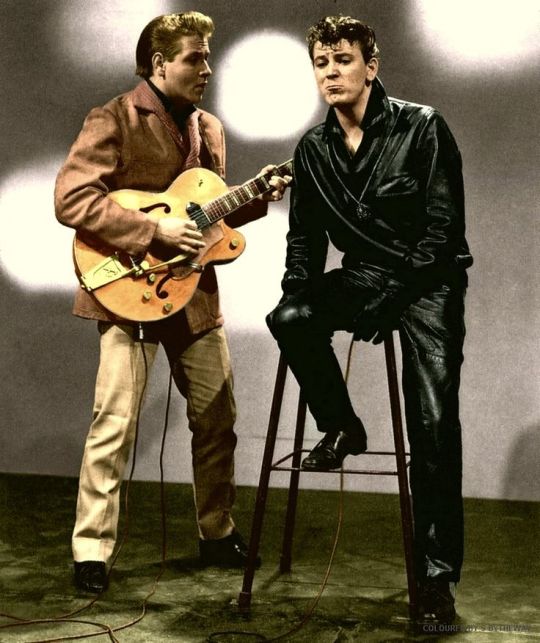
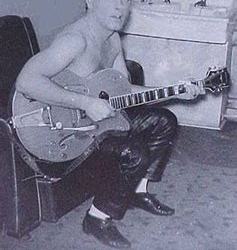
Parnes was the first manager in Britain to become as famous as his artists – the Simon Cowell of his day – with a stable of singers including Tommy Steele, Britain’s first real rock ’n’ roll star, Marty Wilde, Billy Fury, Vince Eager and others. He was also homosexual, a dangerous thing to be at a time when gay men were routinely arrested, fined or even imprisoned.
Their tour was due to take a break after a week of shows in Bristol, and Cochran and co-headliner Gene Vincent wanted to get home to America. Cochran was in a hurry to get to London, where he was going to meet up with Vince Eager before the pair flew to the States together, and Cochran and Vincent rented a private hire taxi, driven by George Martin from Hartcliffe, to take them. Shortly after 11pm on 16 April 1960, their car set off from Bristol’s Royal Hotel (now the Bristol Marriott Royal, on College Green) for London Airport.

Sadly, none of the passengers would make their flight. Less than an hour out of Bristol, Martin realised he had taken a wrong turn. On Rowden Hill, a notorious accident black spot near Chippenham, he lost control and the car spun backwards, hitting a lamppost. The impact of the crash sent Cochran up into the roof of the car and forced the rear passenger side door open, throwing him onto the road. Martin and tour manager Patrick Thompkins, who were in the front of the vehicle, were able to walk away uninjured. The three passengers who had occupied the back seat – Eddie, Gene and Eddie’s girlfriend Sharon Sheeley – were lying on the grass verge. All three were rushed to Chippenham Cottage Hospital, before being transferred to St Martin’s Hospital, just outside Bath. Vincent had broken his collarbone, Sheeley was badly bruised and concussed, but Cochran was seriously injured and would not regain consciousness: he died in hospital in Bath the following day. A young police cadet, David Harman, was among those called to help clear the scene after the crash. Harman would later find fame as Dave Dee, front man of the hit group Dave Dee, Dozy, Beaky, Mick and Tich.

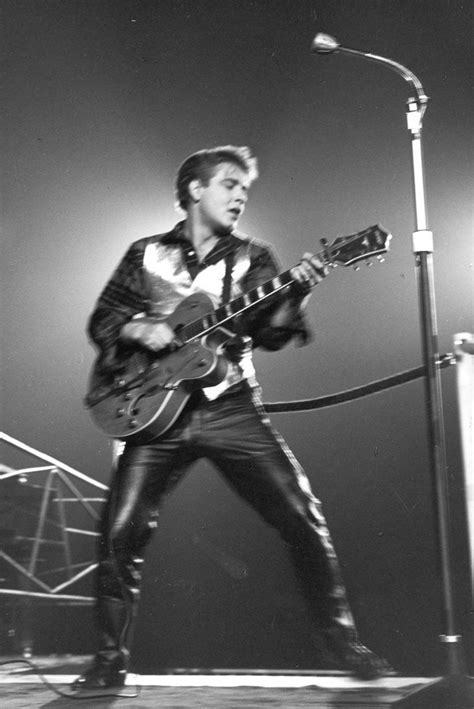
Three weeks after Cochran’s death, Larry Parnes auditioned the Beatles to act as the backing group to his big signing, Billy Fury. They did not win that booking, but he hired them to play with Johnny Gentle on a short tour of Scotland. All of the Beatles were fans of Cochran and Vincent, and lapped up Gentle’s tales of life on the road with the two big American stars. When the 17-year-old George Harrison discovered that Gentle owned the shirt that Cochran had worn on stage in Bristol for that last show he begged the singer to give it to him.
Excerpt from Darryl W. Bullock's book The Velvet Mafia in The Bristol Magazine [x]
#the velvet mafia#1960#eddie cochran#gene vincent#i keep forgetting gene vincent was in the car with cochran#totally missed how close this was to the scottish tour#larry parnes#scotland#johnny gentle#precedent for paul asking for little richards shirt#guess they didnt find fans wanting any piece of textile they every touched was weird if they did it lol#bug influences#may 1960#newspaper clippings#learning gene vincent was from norfolk va and he was so rough looking they put him in leather to lean into it#cochran ends up picking up the leather pants look that spring#he'd just made a splash wearing them on brit tv#the last photo taken of cochran hes in those black leather pants#(top right)#the beatles end up getting a tailor to make pairs that look identical by spring 1961#probably inspired by tony sheridan who had a gene vincent act#gene vincent plays at the star club with them in spring 62#john and pete talk about him being obsessed with his knives and paul has a story of gene pulling out a gun
43 notes
·
View notes
Text
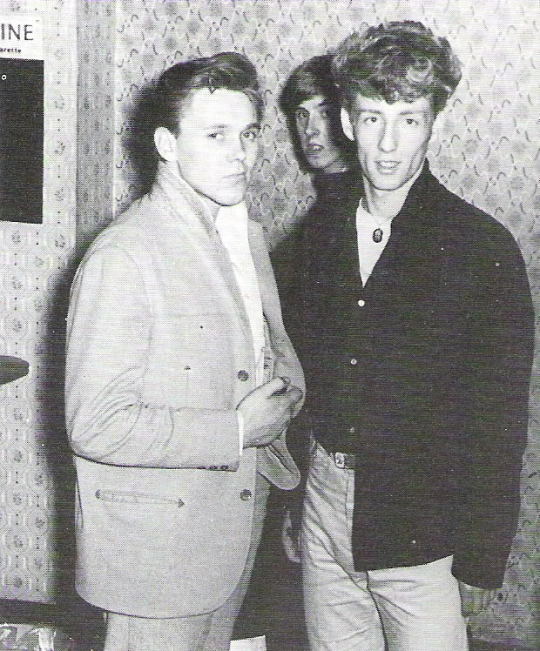
Billy Fury and Rory Storm, 10th May 1960
Rory had shown up to the Larry Parnes' audition day at the Wyvern Social Club, not to audition himself, but to get a photo with Billy. Apparently Rory planned on plastering the photograph all over Liverpool, which infuriated Larry Parnes. Larry threatened never to audition another Liverpool artist again if the photo was printed. (How They Became The Beatles by Gareth L. Pawlowski)
12 notes
·
View notes
Photo
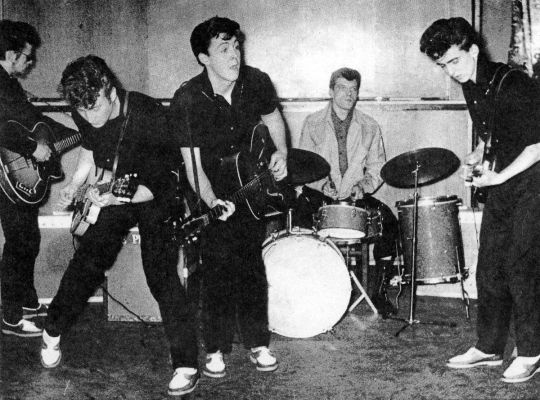

On 10 May 1960, The Silver Beatles auditioned for Larry Parnes. They would end up being hired as a backing band for Johnny Gentle on a tour of Scotland. (Tommy Moore, the band’s drummer at the time, showed up late, so Johnny Hutchinson — of Cass and the Cassanovas — filled in for a few songs). Photos by Cheniston Roland.
The Scotland tour, post 1 of 2.
“It was a bit of a shambles. Larry Parnes didn’t stand up saying that we were great or anything like that. It felt pretty dismal. But a few days later we got the call to go out with Johnny Gentle. They were probably thinking, ‘Oh well, they’re mugs. We’ll send a band that doesn’t need paying.’” - George Harrison, The Beatles Anthology
“I remember asking my big brother [Harry], ‘Would you pack in work and have a go at this if you were me?’ He said, ‘You might as well — you never know what might happen. And if it doesn’t work out you’re not going to lose anything.’ So I packed in my job [as an apprentice electrician at Blackler’s in Liverpool], and joined the band full time and from then on, nine-to-five never came back into my thinking.” - George Harrison, The Beatles Anthology
“That was our first professional gig: on a tour of dance halls miles up in the North of Scotland, around Inverness. We felt, ‘Yipee, we’ve got a gig!’ Then we realized that we were playing to nobody in little halls, until the pubs cleared out when about five Scottish Teds would come in and look at us. That was all. Nothing happened. We didn’t really know anything. It was sad, because we were like orphans. Our shoes were full of holes and our trousers were a mess, while Johnny Gentle had a posh suit. I remember trying to play to ‘Won’t you wear my ring around your neck?’ — he was doing Elvis’s ‘Teddy Bear’ — and we were crummy. The band was horrible, an embarrassment. We didn’t have amplifiers or anything. What little pay we did get we used to take care of the hotels. And we all slept in the van. We would argue about space. There weren’t enough seats in the van, and somebody had to sit on the inside of the mudguard on the back wheel. Usually Stu.” - George Harrison, The Beatles Anthology (x)
#George Harrison#quote#quotes by George#John Lennon#Paul McCartney#Stuart Sutcliffe#The Beatles#The Silver Beatles#The Silver Beatles in Scotland#1960#1960s#fits queue like a glove
143 notes
·
View notes
Photo


Melody Maker - December 25, 1965
Pop Think In
Brian Epstein
Beatles manager Brian Epstein faces up to the pop think-in, a new technique in pop journalism
JUKE BOX JURY: I love playing it because it’s a television show that I can do. I seldom watch it and I don’t think it’s a good programme. It’s quite meaningless. I probably won’t be doing it again because they won’t be asking me after that, will they?
JOHN: Lennon. Great mind, great person. One of the best people I’ve ever met. He’s an interesting character to watch develop.
RED WINE: I like to drink red wine and nothing else alchoholwise, but this doesn’t seem to work out.
SEMI-DETACHED HOUSES: If I say something nasty I’ll get little letters because I said something nasty about semi-detached houses before. But I’d rather have a hut on its own.
GEORGE: Harrison. I always think of George as a friend. Somewhat inconsistent person. Can be difficult. Never has been with me. Great personal charm, but this goes for any Beatle. Any faults the Beatles are supposed to have are never apparent individually. Any faults they have probably only come when they are together as a group. When there is too much talent in one room.
LOVE: A good word in pop songs.
POP WRITERS: Rather intelligent, as journalists go. The dearth of pop knowledge is quite incredible amongst non-musical journalists.
CLIVE EPSTEIN: I’d like him to come into the entertainment business.
RINGO: Ringo’s coming into the group was one of the Beatles’ most brilliant doings. It was something they wanted and that I carried out. It was for so many reasons a quite brilliant move.
PUBLIC SCHOOLS: Difficult because I went to a few. If I had a son I don’t know whether I would send him to one or not.
PAUL: Probably the most changed Beatle. He’s mellowed in character and thought. A fascinating character and a very loyal person. Doesn’t like changes very much. He, probably more than the others, finds it more difficult to accept that he is playing to a cross section of the public and not just to teenagers, or sub-teenagers, whom he feels are the Beatles’ audience.
R.A.D.A: Didn’t like it. Don’t believe in acting schools. I believe in acting experience.
SUCCESS: I’m told I’m successful but I really don’t believe it.
FAILURE: I’d much rather be conscious of my failures than successes. What good do compliments do?
LARRY PARNES: Fascinating! I often wondered if I’d go the same way, but knowing him as I do now, I know I won’t because we’re two very different people.
OLD AGE: Don’t mind. I like getting older because I know more about things.
MONEY: Still scarce.
PALAIS BANDS: Hush. Silence.
ELKAN ALLAN: He wouldn’t be the producer I would choose to direct a spectacular for me. A lucky man I think.
LIARS: Almost everyone.
GOSSIP COLUMNS: The greatest. I love them.
CHRISTMAS: I quite like Christmas. I don’t mind the trappings.
MUSIC PUBLISHERS: Very boring people. They’ve forgotten what a good song is.
BEATLES’ NEXT FILM: No comment yet. Still shrouded in secrecy. There are no announced plans. There will be a new single record in April or May.
SMOKING: I’m not frightened of it.
DRINKING: I haven’t touched spirits for three weeks. It’s a new sensation! I may keep off for a long time.
FREEMASONRY: Not for me.
THE NAME ‘EPPY’: I quite like it but I don’t like it being used to my face. I don’t mind the Beatles using it. I know they do.
BLUNT NORTHERNERS: Splendid, but they’re a bit conscious of their interesting bluntness.
ANTI-SEMITISM: I’m not so conscious of it. Jews who are conscious of it should remember if they had green hair people would stop and stare and sneer and snigger. Particularly if they were famous. I don’t think people in this country particularly dislike people with long noses.
KEN DODD: I admire him. Where does he go from here? The challenge is whether he could make it out of this country.
MILLIONAIRES: Usually disappointing.
BLACKPOOL: Quite like Blackpool, but I shouldn’t want to do a season there personally.
SEEKERS: Don’t know much about them. I met one the other night - quite pleasant.
TRADITIONAL FOLK MUSIC: On the whole I find it boring.
BEING DISLIKED: I suppose I’m conscious of it. It can’t be helped.
ANDREW OLDHAM: An incredible person. He was with us for six months. I had no idea he had creative ability. It taught me not to under-estimate people.
WEST END THEATRES: A sad business, But I’m not disillusioned with my first year’s activities. It’s not going to be of tremendous interest to me until I can bring into the theatre a broader section of the public.
RUMOURED CLOSING OF THE CAVERN: This shouldn’t be so, but it’s nonsense to make it into some sort of charity. It has had a lot of help from people like the Beatles. If it’s not successful now, nobody’s going to cry over it being closed.
LABOUR PARTY: I’m a socialist at heart.
SUMMER SEASONS: They are good for an artist. Can be depressing.
WIGS: Splendid.
BUTLINS: I’d like to go there. Better than a semi-detached house.
DOGS: Terrified of dogs. Almost put me off people.
MARRIAGE: I’d like the state of marriage five days a week.
P.J. Proby: I should have managed him.
--------------------------------------------------------------------------
*RE: Brian’s comments about semi-detached houses: They probably stem from a piece published in Melody Maker’s January 23, 1965 issue - an article where Ringo Starr recalled travelling with Brian and George Harrison to Hampstead, to a party hosted by the magazine:
‘Driving from Knightsbridge to Hampstead in Brian’s new car was good fun. It’s a great car - all those electrically-unwinding windows, central heating and the roof that I prevented Brian from opening on a freezing night!
I can remember George in the back of the car muttering some funny things and saying he’d written his second song; Brian trying in vain to get Luxembourg on his car radio; and nobody quite sure which way to go for Hampstead.
Don’t ask me how, but we got there. Funny - George said something about the houses round there looking pretty good, and I distinctly remember Brian saying to him: “But how COULD you? They’re semi-detached!”’
100 notes
·
View notes
Link
0 notes
Photo

#brian epstein#larry parnes#joe meek#robert stigwood#lionel bart#the velvet mafia#book cover#rock and roll hall of fame
26 notes
·
View notes
Audio
Duffy Power - Where Am I (1964)
Moody British pop from Duffy Power, originally one of Larry Parnes’ late 50s "Golden Boys”. He continued into the 60s as part of the British blues scene but never really had much success. Still, I’m diggin’ this tune.
51 notes
·
View notes
Text

We just got the news that Johnny «Hutch» Hutchinson from Liverpool group The Big Three has passed away. Hutch filled in on drums when The Beatles’ regular drummer Tommy Moore was late for their audition for Larry Parnes in 1960 and again in the transition between Pete Best and Ringo Starr in 1962 after Pete had been fired and Ringo was still fulfilling his commitment to Rory Storm and the Hurricanes until they got a new drummer. Rest in peace.
from thedailybeatles
8 notes
·
View notes
Text
Reading about David Jacobs, Brian's lawyer in London, and came across this random piece of dish on Larry Parnes, the manager who the Beatles audition in front of for the Scotland tour in May 1960:

Wait, like Johnny Gentle??
#'it was said' by whom??#the velvet mafia#larry parnes#known to have taken advantage of his stars so this is a crack people would make#but also aaaaahhh never gonna be able to read those names without thinking it ever again#johnny gentle#my text#1960#david jacobs#scotland#the places factchecking takes me#billy fury was arthur kellys cousin#his real name? ronnie wycherley#that’s show business
5 notes
·
View notes
Text
one of the highlights of Allan WIilliams’ book is describing waiting with the Beatles for Larry Parnes to find out if they would be chosen by him to be Billy Fury’s backing band, which would open up a world of opportunities to their little band going nowhere. Allan is so nervous he’s dry retching in the bathroom, John was trying to hide a ‘severe bout of nerves’, they’re all chain-smoking and drinking anxiously awaiting Larry’s arrival, “the tension in the air was as tangible as congealed blood.”.......................... and Stuart was rambling happily about a recent trip to the art gallery :)
#read the room stu!!!#The Beatles#Allan Williams#Stuart Sutcliffe#Stuart#nicole#remind me to send you the full quote/page!!
23 notes
·
View notes
Photo
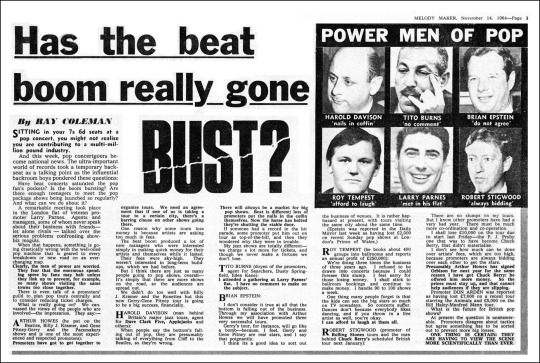
Has the beat boom really gone BUST? (Melody Maker - November 14, 1964)
By RAY COLEMAN
Sitting in your 7s 6d seats at a pop concert, you might not realise you are contributing to a multi-million pound industry.
And this week, pop concertgoers become national news. The ultra-important world of records took a temporary back-seat as a talking point as the influential backroom boys pondered these questions:
Have beat concerts saturated the pop fan’s pockets? Is the boom bursting? Are there enough teenagers to meet the pop package shows being launched so regularly? And what can we do about it?
A remarkable meeting took place in the London flat of veteran promoter Larry Parnes. Agents and managers, some of whom never speak about their business with friends - let alone rivals - talked over the serious problems confronting show-biz moguls.
When that happens, something is going drastically wrong with the well-oiled pop machine that is geared to every breakdown or new road on an ever-changing map.
Clearly, the men of power are worried. They fear that the enormous spending spree by fans may halt unless they link up to prevent, for example, so many shows visiting the same towns too close together.
There is even talk of a promoters’ guild to plan pop tours centrally and to consider reducing ticket charges.
What is really going on? We canvassed the views of the people who are involved - the impresarios. They say:-
ARTHUR HOWES (he put on the Beatles, Billy J. Kramer, and Gene Pitney-Gerry and the Pacemaker shows and is one of the most experienced and respected promoters):
Promoters have got to get together to organise tours. We need an agreement that if one of us is taking a tour to a certain city, there’s a barring clause on other shows going there.
One reason why some tours lose money is because artists are asking too much in fees.
The new beat boom produced a lot of new managers who were interested simply in making quick money for their artists and themselves while it lasted.
Their fees were sky-high. They weren’t interested in long-term build-ups, which we had before.
But I think there are just as many people going to pop shows, overall - It’s simply that there are more shows on the road, so the audiences are spread out.
We didn’t do too well with Billy J. Kramer and the Ronettes but this new Gerry-Gene Pitney tour is going to be a big success, financially.
HAROLD DAVISON (man behind Britain’s major jazz tours, agent for Dave Clark Five, Applejacks and others):
When people say the bottom’s falling out of pop, they are presumably talking of everything from Cliff to the Beatles, so they’re wrong.
There will always be a market for big pop shows. Beat is different: lots of promoters put the nails in the coffin themselves. Now the horse has bolted they’re shutting the stable door.
If someone had a record in the hit parade, some promoter put him out on tour as top-of-the-bill, and then they wondered why they were in trouble.
My jazz shows are totally different - we charge a lot more for tickets, and though we never make a fortune we don’t lose.
TITO BURNS (doyen of the promoters, agent for Searchers, Dusty Springfield, Eden Kane):
I attended a gathering at Larry Parnes’ flat. I have no comment to make on the subject.
BRIAN EPSTEIN:
I don’t consider it true at all that the bottom is falling out of the business. Through my association with Arthur Howes we will have promoted three very successful tours.
Gerry’s tour, for instance, will go like a bomb - because, I feel, Gerry and Gene Pitney are real stars, and I say that poignantly.
I think its a good idea to sort out the business of venues. It is rather hap-hazard at present, with tours visiting the same city about the same time.
(Epstein was reported in the Daily Mirror last week as having lost £2,000 on recent Sunday pop shows at London’s Prince of Wales.)
ROY TEMPEST (he books about 400 groups into ballrooms and reports an annual profit of £250,000):
We’re doing three times the business of three years ago. I refused to be drawn into contracts because I could foresee this slump. I feel sorry for those losing money. I shall stick to ballroom bookings and continue to make money. I handle 90 to 100 shows a week.
One thing many people forget is that the kids can see the big stars so much on TV nowadays. So concerts suffer. Dances don’t because everybody likes dancing, and if you throw in a live artist as well, you’re okay.
I can afford to laugh at them all.
ROBERT STIGWOOD (promoter of Rolling Stones tours and the man behind Chuck Berry’s scheduled British tour next January):
There are no slumps on my tours. But I know other promoters have had a very bad year. There must be much more co-ordination and co-operation.
I shall lose £10,000 on the tour due to start last Friday - the P.J. Proby one that was to have become Chuck Berry, that didn’t materialise.
I don’t see how much can be done over artist’s fees, which are too high, because promoters are always bidding over each other to get the stars.
Presumably Arthur Howes has signed Orbison for next year for the same reason I have got Chuck Berry: he offered him more money. So the prices must stay up, and that cannot help audiences if they are slipping.
Promoter DON ARDEN was reported as having lost £7,000 on a recent tour starring the Animals and £5,000 on the Bill Haley-Manfred Mann tour.
What is the future for British pop shows?
At present the question is unanswerable. Promoters disagree about tactics but agree something has to be sorted out to prevent more big losses.
ONE THING IS CERTAIN: THEY ARE HAVING TO VIEW THE SCENE MORE SCIENTIFICALLY THAN EVER.
#Brian Epstein#Ray Coleman#Melody Maker#Robert Stigwood#Larry Parnes#Tito Burns#Harold Davison#Roy Tempest#Arthur Howes#1964#60s
14 notes
·
View notes
Link
0 notes
Text
Architects of Rock
The Gay Architects of Rock
That understanding played out in vital Rolling Stone pictures like David Cassidy flaunting his bare middle down to his pubic hair, in a Playboy-style centerfold, and Jim Morrison seething beside the cover line "He's Hot, He's Sexy, He's Dead."
Athlete McLean, who acted as an associate to George Harrison 50 years prior, saw the profundity of the connection between the Beatles and Mr. Epstein one August day not some time before the chief's demise. Mr. McLean's activity was to get the artist musician Harry Nilsson, a promising new craftsman back then, and drive him to a meeting with Mr. Harrison at the house he was leasing on Blue Jay Way in the Hollywood Hills, Calif.
Photograph Mr. Epstein, focus, with the Beatles in a lodging in Paris in January 1964. Credit Harry Benson/Hulton Archive, by means of Getty Images
There was discussion of Mr. Nilsson maybe joining the Beatles' incipient organization. That is when things turned sour, Mr. McLean said.
"George was discussing how brilliant the entire thing would have been, endeavoring to persuade Harry to join the organization," Mr. McLean reviewed. "It was all awesome until the point when Harry stated, 'The main thing is, I don't figure I could be overseen by a gay man.'" (Mr. Epstein's sexuality was known by numerous in the business at the time.)
Angered, Mr. Harrison gave his aide a gesture.
"Instant, Harry was out of the house," Mr. McLean said. "George, similar to all the Beatles, was amazingly strong of Brian. To them, Brian was the man." (After Mr. Epstein kicked the bucket, Mr. Nilsson had a rapprochement with the band and worked intimately with John Lennon.)
Roger Daltrey, the lead vocalist of the Who, had a comparable regard for Mr. Lambert, who had a high society foundation when those of his level once in a while collaborated with common laborers miscreants like Mr. Daltrey.
"Pack was the main 'elegant' fellow I at any point met who wouldn't speak condescendingly to me," Mr. Daltrey said in "Lambert and Stamp." "Pack had this courageous quality."
At the time, men like Mr. Lambert needed to. Up until 1967, being gay was illicit in Britain, and long after that law changed, gay men remained an objective of police entanglement, extortion and beatings. Mr. Epstein was struck and was the objective of extortion before he kicked the bucket in 1967 from a unintentional overdose of dozing pills and liquor.
In the meantime, huge numbers of these men included extraordinary power inside their circle. As administrators of a portion of the time's most strong British musical crews, they remained at the bleeding edge of sounds, sensibilities and styles that would devastate and redo popular culture.
The gay chiefs of that time were blunt about their sexuality, if just among companions and associates. Other than Mr. Epstein and Mr. Lambert, those men included Robert Stigwood (director of Cream and the Bee Gees), Simon Napier-Bell (the Yardbirds, Marc Bolan), Billy Gaff (Rod Stewart), Ken Pitt (David Bowie), Barry Krost (Cat Stevens) and Larry Parnes (who formed pre-Beatles British rockers, including Tommy Steele and Billy Fury).
Photograph Jann Wenner, the fellow benefactor of Rolling Stone magazine, in 1970. Credit Bettmann Archive
Their sexual introduction was reflected by Americans including Nat Weiss (who supervised the Beatles' business advantages and later oversaw James Taylor), Danny Fields (who oversaw Iggy Pop and the Stooges and, later, the Ramones), and in addition music tycoons including David Geffen and Clive Davis (who recognizes as cross-sexual).
As indicated by Mr. Napier-Bell, some portion of the reason British gay men of his time inclined toward the music business was on the grounds that it was one of only a handful couple of ranges "where you could be out among yourselves. It resembled a private club," he said. "It was such a decent life. You'd go to Robert Stigwood's home and it resembled a gay bar."
Jim Fouratt, who has worked in the music business since the 1960s, trusts the men in Mr. Napier-Bell's hover conveyed to the rising rock scene an uncommon comprehension of picture. "As gay men, we need to change ourselves keeping in mind the end goal to survive," he said. "That matches impeccably with the disguise of shake 'n' move, with the dream."
Martin Aston, the creator of "Separating the Walls of Heartache: How Music Came Out," said the association between shake's gay directors and picture shaping stems from the way that "gay men at the time would be judged altogether on what they looked like. It wasn't care for there were bunches of pleasant spots to go and have beautiful discussions. It was altogether conveyed through cruising."
Subsequently, Mr. Aston stated, gay men built up a solace with the specialty of being seen, "rather than straight men, who, before the marvel of the 'metrosexual,' were undermined by the idea of being taken a gander at, of turning into a protest."
Vivek Tiwary, the creator of "The Fifth Beatle," contends that Mr. Epstein's sexual introduction affected the Beatles' open picture.
"Brian Epstein's appreciation for the greater part of the Beatles, and specifically to John, enabled him to make a picture for the band that was engaging to young ladies, as well as to young men," Mr. Tiwary said. "Brian recognized what it resembled to be a kid, and also how to draw in them. A straight chief may very well believe, 'Here's a cluster of adorable young men that young ladies will love.' He may make them so young lady inviting that they appear to be excessively powerless for folks, making it impossible to get into them."
One of Mr. Epstein's essential choices was to change the Beatles' outfits, from denim and cowhide to natty suits. Utilizing the best neighborhood tailors, he got the band into single-breasted, three-catch mohair suits, with limit lapels and considerably smaller jeans, as indicated by Mark Lewisohn in his book on the band, "Tune In."
Photograph From left, Pete Townshend, Kit Lambert and Roger Daltrey, recording in I.B.C Studios, amid the Who's sessions for "The Seeker." Credit Chris Morphet/Redferns
By sharpening such looks, the chiefs accomplished more than impact the introduction of artists. They propelled the picture of another sort of man. As the '60s advanced, hermaphrodism wound up noticeably integral to male show, with long hair, splendidly hued attire, and, on account of the mods of the mid-'60s, gaudy custom-made suits.
"The mods adored just to be seen strolling down the road, sharp dressed with sharkskin jeans and cosmetics," said James Cooper, the chief of "Lambert and Stamp." "These extreme folks wore eyeliner."
Mr. Fouratt believes that a significant part of the consent for the sexual orientation obscuring originated from the spreading drug culture. "Medications enabled men and young men to find their magnificence and gentility," he said. "The egotistism of heroes resembles the peacock, where the male is the wonderful one, not the female. That turned into the bleeding edge in shake 'n' roll, energized by the gay chiefs."
It played out most unmistakably in a star like Mick Jagger, who embraced a batty and dressing persona, influences shared by the Rolling Stones' first administrator, Andrew Loog Oldham.
"Mick was alluring for that trimming," Mr. Oldham said. "Numerous men may state to their mates, 'Gracious, he's a poof!' So they wouldn't fret their spouses or lady friends getting a charge out of him."
Straight demigods additionally found that appropriating the arousing consciousness of gay men paid off in sexual open doors. "David Bowie needed to constrain the regular workers folks in his band the Spiders from Mars to wear those glitz garments," Mr. Aston said. "In any case, when they saw the effect it had on ladies, they resembled, 'Pass me the redden!'"
In any case, given the denunciation of homosexuality at the time, one may anticipate that the rockers will have some inconvenience with the gay men who prompted them. On account of the Who, Mr. Cooper trusts the individuals fortified with Mr. Lambert not notwithstanding his sexual personality but rather in some courses as a result of it. The improbability, and common hazard, of the association between Mr. Lambert (a high society, favored gay man) and his accomplice in administration, Chris Stamp (a straight road kid) awed them profoundly.
2 notes
·
View notes
Photo

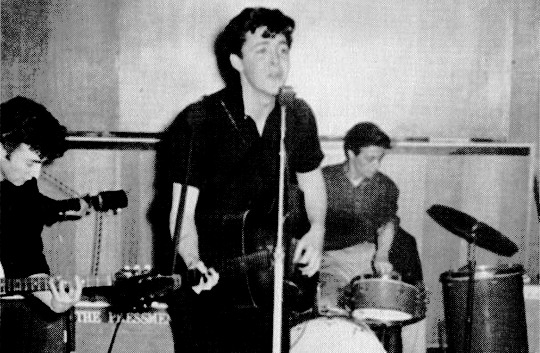
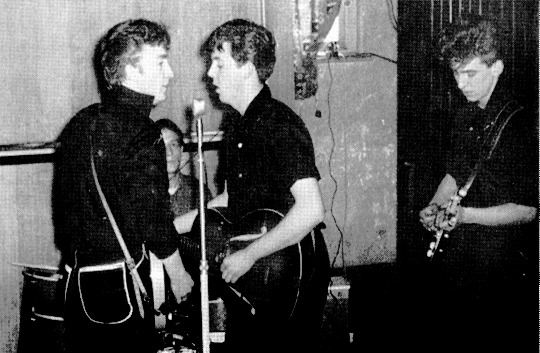
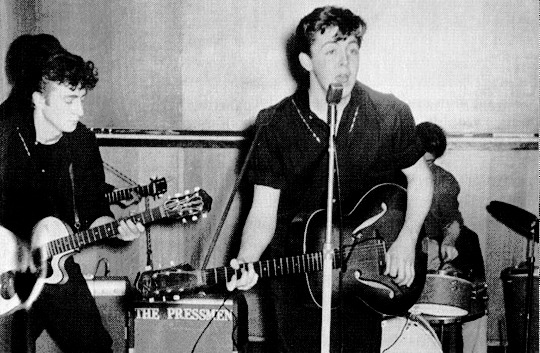
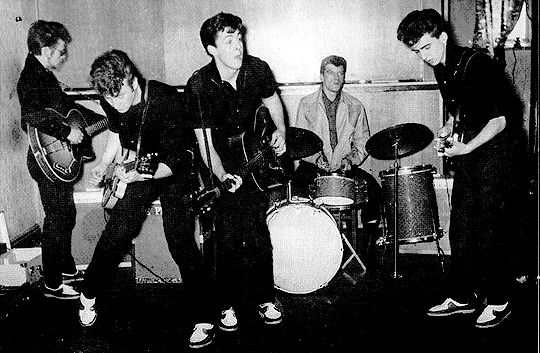
10 May 1960 // Wyvern Social Club (The Blue Candle) // Photographer: Cheniston Roland
“This was an audition in search of a backing band for an upcoming Billy Fury tour. The Silver Beatles didn't win the audition. However, Larry Parnes liked what he heard and hired the band to back Johnny Gentle on a tour of Scotland at the end of May. [...]
These photos illustrate perfectly Stuart's tendancy to play with his back to the audience. At one point during the audition, Parnes requested to hear the band without Stuart. John would have no part of it. "We're a group, all or none. That's the way it is."”
#beatlesedit#the beatles#john lennon#paul mccartney#stuart sutcliffe#george harrison#1960#music: the beatles#edit: mybeatles#baby bugs#the early days#long post
13 notes
·
View notes